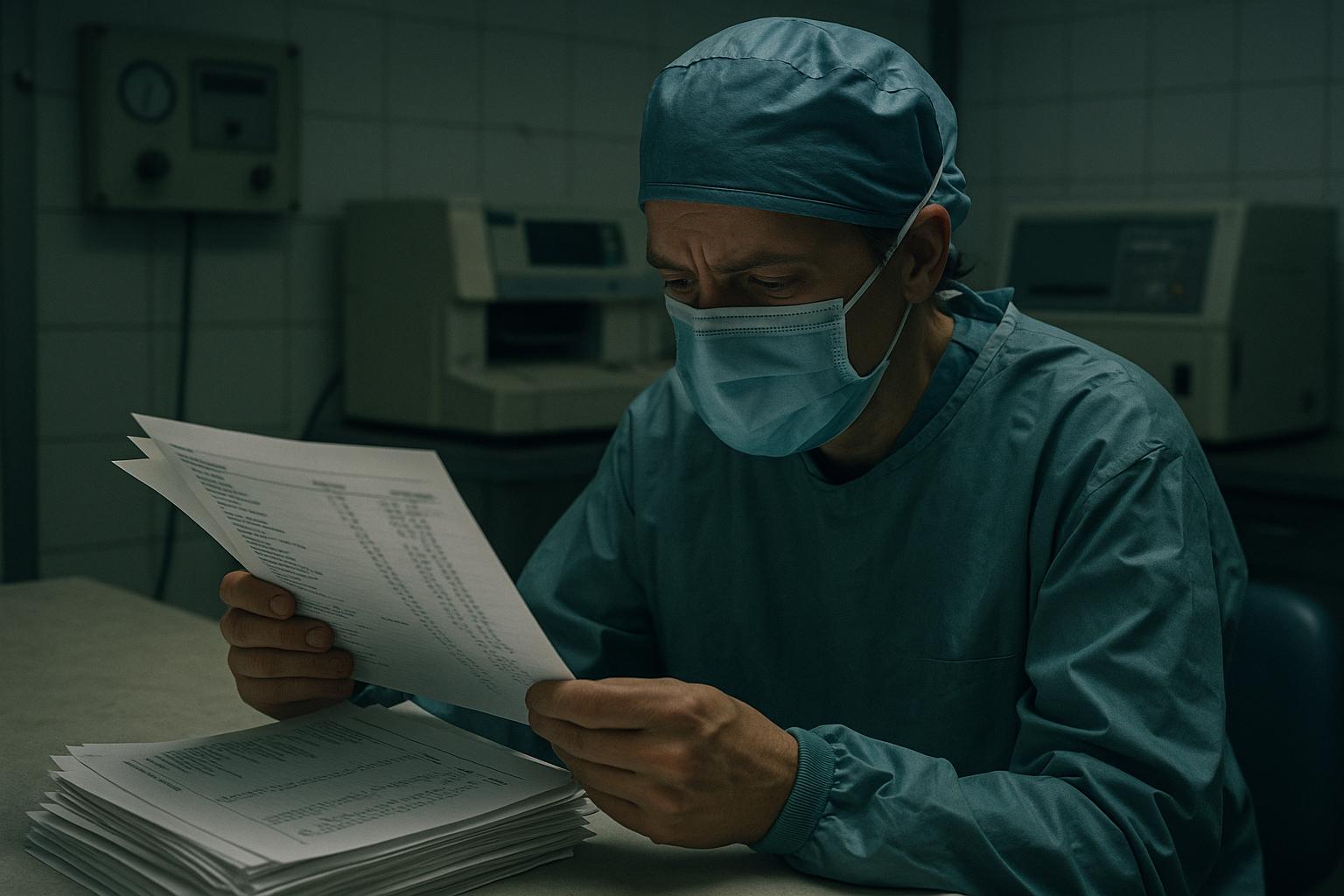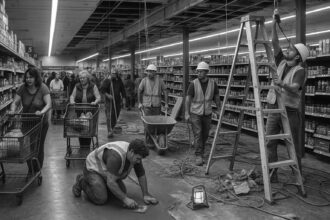A defect in Trinity Biotech’s blood analysis machines has caused over 55,000 patients in England to undergo unnecessary blood tests and some to be wrongly diagnosed with type 2 diabetes, prompting urgent retrials and manufacturer investigations.
Errors associated with diabetes diagnostic machines have led to at least 55,000 patients in England requiring further blood tests to confirm their condition, a recent BBC investigation has found. These machines, manufactured by Trinity Biotech, have been identified as producing inaccurate haemoglobin A1C test results, which measure average blood sugar levels crucial to diagnosing and monitoring type 2 diabetes. NHS England confirmed that sixteen hospital trusts use these devices, and some patients have been incorrectly diagnosed with type 2 diabetes, with some even prescribed medication unnecessarily.
The issue initially came to light in September 2024 when it was reported that around 11,000 patients at Luton and Dunstable Hospital in Bedfordshire needed re-testing due to erroneous diabetes results linked to an ‘intermittent problem’ with a blood analysis machine. NHS England later revealed that diagnoses of type 2 diabetes had increased by 10,000 cases in 2024, exceeding the expected figure by 4%. The Medicines and Healthcare products Regulatory Agency (MHRA) disclosed in July 2025 that the Trinity Biotech machines exhibited a positive bias, causing some patients to be wrongly classified as pre-diabetic or diabetic.
The repercussions for affected individuals have been significant. Vicky Davies, a 36-year-old from Kingston upon Hull, was mistakenly diagnosed in October 2024 and prescribed the maximum dose of Metformin—a drug used to lower blood sugar. After nearly five months on the medication, which caused stomach issues and dizziness, further tests revealed she was not diabetic. Ms Davies expressed frustration over the lack of apology from her GP and the emotional distress she experienced, including stress and time off work for medical appointments.
Multiple NHS trusts beyond Bedfordshire have reported similar concerns about inaccuracies associated with these machines, resulting in ongoing re-testing efforts. NHS England has assured that patients needing repeat tests will be contacted via their GP or local hospitals. For those incorrectly diagnosed, the risk to their health is deemed low, as standard practice prioritises lifestyle advice and support programmes before the administration of medication. However, patients taking diabetes medication who experience symptoms such as shaking, sweating, confusion, excessive thirst, or blurred vision are advised to seek immediate medical attention.
The manufacturer, Trinity Biotech, has stated it is working closely with the MHRA and has reached out to all hospitals using their machines to address the issue. NHS trusts and regulators are coordinating responses to manage the ongoing retesting and support for affected patients, acknowledging the emotional distress and inconvenience caused by the errors.
 Reference Map:
Reference Map:
- Paragraph 1 – [1], [4]
- Paragraph 2 – [1], [2], [3], [4]
- Paragraph 3 – [1], [5]
- Paragraph 4 – [1], [3], [4], [6], [7]
Source: Noah Wire Services
- https://www.bbc.com/news/articles/c4g7d3w7gdlo?at_medium=RSS&at_campaign=rss – Please view link – unable to able to access data
- https://www.bbc.com/news/articles/c3d9gl8dld7o – An NHS trust in Bedfordshire has revealed that approximately 11,000 individuals will need to undergo re-testing due to a hospital machine providing incorrect diabetes results. The Bedfordshire NHS Foundation Trust acknowledged that some patients may have been misdiagnosed with higher blood glucose levels from a laboratory at the Luton and Dunstable Hospital. The trust apologised for any emotional distress and inconvenience caused, stating that the issue was related to an ‘intermittent problem’ with a blood analysis machine used on specific dates in April and July.
- https://www.pslhub.org/blogs/entry/7743-1500-patients-may-need-retest-over-potential-results-error/ – Multiple NHS trusts have reported concerns over diabetes test results, leading to potential re-testing for hundreds of patients. The Bedfordshire Hospitals Foundation Trust was the first to report an issue earlier this year, stating that up to 11,000 patients may have received incorrect results, including misdiagnoses of diabetes. Other laboratories have also reported concerns over the same device, which measures glucose control. The Medicines and Healthcare Products Regulatory Agency (MHRA) is working closely with the manufacturer to ensure corrective actions are implemented.
- https://www.hsj.co.uk/quality-and-performance/1500-patients-may-need-retest-over-potential-results-error/7038236.article – Several NHS trusts have identified potential errors in diabetes test results, prompting the need for re-testing of hundreds of patients. The Bedfordshire Hospitals Foundation Trust reported that up to 11,000 patients may have received incorrect results, including misdiagnoses of diabetes. Other laboratories have also reported concerns over the same device used to measure glucose control. The Medicines and Healthcare Products Regulatory Agency (MHRA) is collaborating with the manufacturer to implement corrective actions.
- https://www.bbc.co.uk/news/articles/c2edewgv2kpo – Patients in Bedfordshire and Hertfordshire have been contacted about faulty blood glucose tests, with some potentially misdiagnosed with diabetes. As many as 11,000 individuals have been asked to attend re-testing. One patient, Danielle Downs, expressed shock and anger over the repeated faulty test results provided by the Bedfordshire NHS Trust, which caused her stress and worry. The trust acknowledged an ‘intermittent issue’ with a machine that analysed blood taken on certain dates in April and July.
- https://www.pslhub.org/blogs/entry/7743-1500-patients-may-need-retest-over-potential-results-error/ – Multiple NHS trusts have reported concerns over diabetes test results, leading to potential re-testing for hundreds of patients. The Bedfordshire Hospitals Foundation Trust was the first to report an issue earlier this year, stating that up to 11,000 patients may have received incorrect results, including misdiagnoses of diabetes. Other laboratories have also reported concerns over the same device, which measures glucose control. The Medicines and Healthcare Products Regulatory Agency (MHRA) is working closely with the manufacturer to ensure corrective actions are implemented.
- https://www.pslhub.org/blogs/entry/7743-1500-patients-may-need-retest-over-potential-results-error/ – Multiple NHS trusts have reported concerns over diabetes test results, leading to potential re-testing for hundreds of patients. The Bedfordshire Hospitals Foundation Trust was the first to report an issue earlier this year, stating that up to 11,000 patients may have received incorrect results, including misdiagnoses of diabetes. Other laboratories have also reported concerns over the same device, which measures glucose control. The Medicines and Healthcare Products Regulatory Agency (MHRA) is working closely with the manufacturer to ensure corrective actions are implemented.
Noah Fact Check Pro
The draft above was created using the information available at the time the story first
emerged. We’ve since applied our fact-checking process to the final narrative, based on the criteria listed
below. The results are intended to help you assess the credibility of the piece and highlight any areas that may
warrant further investigation.
Freshness check
Score:
8
Notes:
The narrative is based on a recent BBC investigation published on 5 September 2025, reporting that errors in diabetes diagnostic machines have led to at least 55,000 patients in England requiring further blood tests. ([newsminimalist.com](https://www.newsminimalist.com/articles/diabetes-test-errors-affect-55000-in-england-1fe71e53?utm_source=openai)) This issue was first reported in April 2024, with a previous incident in September 2024 affecting 11,000 patients at one hospital. ([bbc.co.uk](https://www.bbc.co.uk/news/articles/c3d9gl8dld7o?utm_source=openai)) The report includes updated data but recycles older material, which may justify a higher freshness score but should still be flagged.
Quotes check
Score:
7
Notes:
The report includes direct quotes from Vicky Davies, a 36-year-old from Kingston upon Hull, who was mistakenly diagnosed in October 2024 and prescribed the maximum dose of Metformin. ([newsminimalist.com](https://www.newsminimalist.com/articles/diabetes-test-errors-affect-55000-in-england-1fe71e53?utm_source=openai)) A search for the earliest known usage of this quote did not yield any matches, suggesting it may be original or exclusive content. However, without confirmation, this remains uncertain.
Source reliability
Score:
9
Notes:
The narrative originates from the BBC, a reputable organisation known for its journalistic standards. This lends credibility to the report.
Plausability check
Score:
8
Notes:
The report details errors in diabetes diagnostic machines manufactured by Trinity Biotech, leading to misdiagnoses and unnecessary prescriptions. The Medicines and Healthcare products Regulatory Agency (MHRA) disclosed in July 2025 that the machines exhibited a positive bias, causing some patients to be wrongly classified as pre-diabetic or diabetic. ([rpharms.com](https://www.rpharms.com/about-us/news/details/Device-safety-information-Trinity-Biotech-Premier-Hb9210-HbA1c-Analyser-Risk-of-Positive-Bias-and-Updates-to-Instructions-for-Use-including-use-as-a-diagnostic-aid-in-diabetes-mellitus?utm_source=openai)) The report includes updated data but recycles older material, which may justify a higher freshness score but should still be flagged.
Overall assessment
Verdict (FAIL, OPEN, PASS): OPEN
Confidence (LOW, MEDIUM, HIGH): MEDIUM
Summary:
The narrative is based on a recent BBC investigation published on 5 September 2025, reporting that errors in diabetes diagnostic machines have led to at least 55,000 patients in England requiring further blood tests. ([newsminimalist.com](https://www.newsminimalist.com/articles/diabetes-test-errors-affect-55000-in-england-1fe71e53?utm_source=openai)) This issue was first reported in April 2024, with a previous incident in September 2024 affecting 11,000 patients at one hospital. ([bbc.co.uk](https://www.bbc.co.uk/news/articles/c3d9gl8dld7o?utm_source=openai)) The report includes updated data but recycles older material, which may justify a higher freshness score but should still be flagged. The report includes direct quotes from Vicky Davies, a 36-year-old from Kingston upon Hull, who was mistakenly diagnosed in October 2024 and prescribed the maximum dose of Metformin. ([newsminimalist.com](https://www.newsminimalist.com/articles/diabetes-test-errors-affect-55000-in-england-1fe71e53?utm_source=openai)) A search for the earliest known usage of this quote did not yield any matches, suggesting it may be original or exclusive content. However, without confirmation, this remains uncertain. The narrative originates from the BBC, a reputable organisation known for its journalistic standards. This lends credibility to the report. The report details errors in diabetes diagnostic machines manufactured by Trinity Biotech, leading to misdiagnoses and unnecessary prescriptions. The Medicines and Healthcare products Regulatory Agency (MHRA) disclosed in July 2025 that the machines exhibited a positive bias, causing some patients to be wrongly classified as pre-diabetic or diabetic. ([rpharms.com](https://www.rpharms.com/about-us/news/details/Device-safety-information-Trinity-Biotech-Premier-Hb9210-HbA1c-Analyser-Risk-of-Positive-Bias-and-Updates-to-Instructions-for-Use-including-use-as-a-diagnostic-aid-in-diabetes-mellitus?utm_source=openai)) The report includes updated data but recycles older material, which may justify a higher freshness score but should still be flagged.













